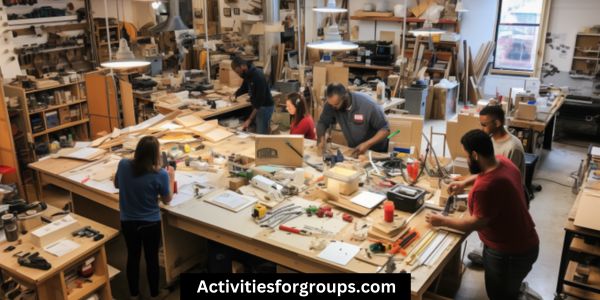Are you looking to organize a volunteer group, but don’t know where to start? Don’t worry, because we’ve got you covered.
From assigning roles to effective communication, we’ll discuss the best strategies for organizing group volunteer work.

You’ll also learn how to schedule planning sessions, establish goals, and track progress.
Get ready to make a difference!
Assigning Roles
Assigning roles is key to successfully organizing group volunteer work. It’s important to make sure each volunteer has a designated role and that they understand the tasks expected of them. Establishing mentoring volunteers to help guide and support other volunteers is also beneficial.
When delegating tasks, it’s important to take into account any special skills or interests that each volunteer may have. This will help ensure that each volunteer is able to contribute to the team in a meaningful way and will boost morale. It’s also important to remember that each volunteer has a limited amount of time and energy, and tasks should be assigned accordingly.
Additionally, it’s important to make sure that volunteers have the resources they need to do their jobs properly. Finally, it’s important to recognize the efforts of each volunteer and to provide feedback in a timely manner.
Effective Communication
Once roles have been assigned and tasks delegated, effective communication is essential for organizing group volunteer work. It can help reduce misunderstandings and ensure that everyone is on the same page. Here are some strategies to help promote effective communication:
- Set up regular meetings: Establish regular meetings to ensure that everyone is updated on the progress of the project. This can also provide an opportunity for volunteers to ask any questions they may have about their tasks.
- Use online tools: Utilize online tools such as group messaging, video conferencing, and project management software to keep everyone connected. This can make it easier to keep track of tasks and stay in the loop about any changes.
- Provide feedback: Give volunteers feedback on their work. This can help motivate them and ensure that tasks are being delegated correctly. Additionally, it can help ensure that volunteers are held accountable for their work.
Scheduling Planning Sessions

In addition to their feedback, volunteers should also be kept informed of their tasks’ progress by scheduling planning sessions. Planning sessions are a great way to ensure that everyone is on the same page and that tasks are being completed in a timely manner.
During a planning session, tasks should be prioritized and delegates should be assigned to each task. It’s important that all volunteers have a clear understanding of their duties and responsibilities.
Planning sessions should be held regularly to ensure that volunteers are up-to-date on any changes or updates to the project. In addition to discussing tasks and assigning duties, it’s also important to discuss any challenges that the group may be facing and to work together to create solutions. Having a clear plan of action will help the group stay organized and on task.
It is also important to set realistic timelines that are achievable. This will help keep the group motivated and on track. If tasks are taking longer than expected, it’s important to reassess and adjust the timeline as needed. This will help keep the group organized and on task.
Establishing Goals
Before beginning any group volunteer work, it’s important to establish clear goals. This helps ensure that everyone is on the same page and that tasks are completed efficiently. Here are some key strategies for focusing priorities, recognizing strengths, and setting achievable goals:
- Brainstorm ideas: Gather the group and discuss potential goals for the volunteer project. Brainstorming helps ensure that all ideas are taken into consideration when deciding on the best path forward.
- Assign tasks: Break the project down into manageable tasks and assign each task to a member of the group. This will help ensure that everyone is responsible for a specific part of the project and that all tasks are completed in a timely manner.
- Set deadlines: Establish realistic deadlines for each task and make sure the entire group is aware and accountable. This will help keep everyone motivated and ensure the project is completed on time.
Tracking Progress

Tracking progress is key to the success of any group volunteer work. Establishing clear objectives and guidelines allows teams to prioritize tasks and measure outcomes.
To stay on track, team leaders should consider creating a simple tracking system to track and monitor the team’s progress. This system should include a timeline, milestones, and team building exercises.
| Milestones | Timeline |
|---|---|
| Establish goals | Set deadlines |
| Allocate resources | Monitor progress |
| Assign tasks | Adjust timeline if needed |
| Track progress | Celebrate successes |
This system can be as basic or complex as the team needs. It should be tailored to the team’s goals and objectives and be regularly reviewed and adjusted as needed.
Tracking progress will not only help the team stay on task, but will also help build confidence, foster camaraderie, and ensure that the team meets its goals. By utilizing these strategies, volunteers can ensure that their work is completed with maximum efficiency.
Frequently Asked Questions
What Are the Different Types of Volunteer Work Available?
Volunteer work can involve engaging youth, connecting communities, and helping those in need. It can range from assisting the homeless to teaching about the environment. There are plenty of opportunities available to make a positive impact!
How Do You Manage Different Personalities in a Group?
You can manage different personalities in a group by creating clear boundaries and encouraging effective communication. Discuss expectations and be open to different perspectives to create a successful team.
What Resources Are Available to Help With Organizing Volunteer Work?
You have access to many resources to help organize volunteer work, such as incentive systems and communication tools. These can help you effectively manage different personalities and make organizing easier.
How Do You Motivate Volunteers to Stay Committed?
Making sure your volunteers feel appreciated is key. Offer incentive systems and be mindful of their time. Being organized will help them stay committed and motivated.
How Can You Ensure That Volunteers Feel Appreciated?
Recognize volunteers’ efforts and provide feedback to show your appreciation. Let them know their work is valued and appreciated.
Conclusion
Organizing group volunteer work doesn’t have to be a daunting task. By assigning roles, communicating effectively, scheduling planning sessions, establishing goals, and tracking progress, you can ensure that your group is working efficiently and achieving its goals.
With the right strategies in place, your group can make a lasting impact on your community.




Leave a Reply